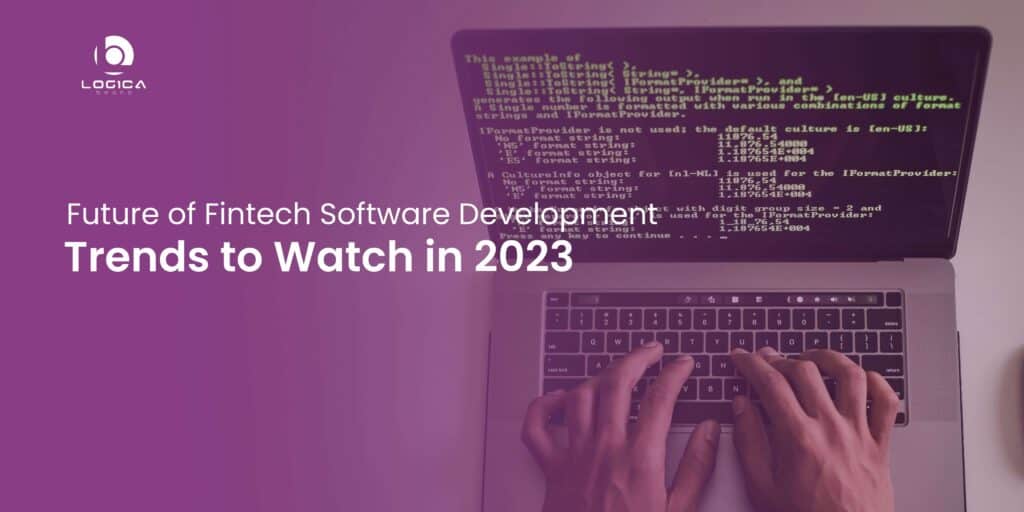Staying ahead of the curve in the quickly changing world of financial technology is no easy task. Fintech has transformed the way we handle our funds, making them easier to access, efficient, and user-friendly. It shattered existing banking institutions and cleared the path for new financial alternatives. As we go through this digital era, it is evident that fintech software development will continue to play an important role in creating our financial destiny.
The dynamic nature of this sector needs ongoing alertness to developing trends. From artificial intelligence to blockchain technology, these developments are not only altering the finance industry but also reshaping client expectations.
In this blog article, we will dig into the coming years of fintech software development, analyzing the key concepts that industry professionals as well as enthusiasts should be aware of. Understanding these patterns might give vital insights into the probable future direction of this interesting business, whether you’re a financial company, a software engineer, or merely a tech enthusiast.
Current Landscape of Fintech Software Development
One of the prominent trends now is the emphasis on a mobile-first approach, as the fintech software development company prioritizes the creation of user-friendly mobile applications. These applications provide users with a handy way to access and manage their finances while on the road.
Blockchain and cryptocurrencies have been revolutionizing the fintech industry. They provide a novel, decentralized, transparent, and perhaps more secure method of exchanging and storing wealth. This has resulted in an increase in both individual and commercial interest and adoption.
In current situations, for fintech startups, navigating regulatory compliance remains a primary issue. The financial regulatory environment is complicated and frequently differs by area. To guarantee that their operations are legally sound and safe, fintech businesses must adapt to and comply with shifting legislation. In different regions of the world, open banking ideas are gaining popularity. These efforts enable third-party fintech applications to access financial data with user authorization, boosting innovation by allowing the development of apps that can aggregate data from numerous financial institutions.
As you may notice that the technology has grown more, and people are having ease in their daily life. What was previously a developing sector now has grown tremendously as a result of the widespread use of contactless payment systems, which provide both ease and security.
Given the growing digitization of financial services, cybersecurity is a top priority. Fintech firms spend heavily on comprehensive security measures to safeguard user data and financial transactions from cyber-attacks. The fintech software development aims to gain headway. Digital banking and microfinance applications are meeting the requirements of disadvantaged people that do not have access to traditional banking services, hence helping to broader financial inclusion.
Partnerships and ecosystems are emerging among fintech firms, conventional banks, IT behemoths, and other financial institutions. These partnerships seek to broaden the reach and capabilities of fintech services, resulting in a more linked financial environment.
The current landscape of fintech software development is dynamic and changing at a quick pace. Digital payments, mobile banking, and peer to peer payment systems have transformed how we conduct financial transactions, making them more convenient, safe and efficient.
Trends Shaping the Future of Fintech Software Development
Several major trends are likely to define the future of fintech software development, influencing how financial technology advances and continues to impact various sectors of the business.
Some of the trends shaping the future of fintech software development are given as follows:
● DeFi
DeFi- Decentralized Finance was gaining significant popularity and was projected to develop further. Built on blockchain technology, DeFi platforms aim to decentralize traditional financial activities such as lending, borrowing, and trading. Fintech developers were looking into DeFi apps that might disrupt established banking systems.
● Cybersecurity innovations
As cyber threats have evolved these days, fintech software development is now focusing on advanced cybersecurity techniques to secure sensitive financial data and transactions. Encryption, biometrics, and real-time threat detection are examples of such advancements.
● Cross Border Payment
As digital currencies are viewed as game-changers in the field of fintech, the fintech developers are now looking the more efficient and cost-effective ways to make cross border payments. This can be one of the popular future trends in fintech software development.
● AI & Machine Learning
AI and machine learning technologies have now advanced. These developments were anticipated to be used by fintech developers to create more advanced fraud detection, risk assessment, and personalized financial advice.
● Embedded Finance
Embedded finance is the notion of smoothly integrating financial services with non-financial platforms and applications. APIs (Application Programming Interfaces) and SDKs (Software Development Kits) were being developed by fintech developers to enable businesses to incorporate financial services, such as payments and loans, within their products.
As the fintech sector continues to develop, these areas will surely define the future landscape of financial technology, improving accessibility, security, and efficiency in the financial world. Keeping an eye on these trends and encouraging innovation will be critical as developers and stakeholders navigate this changing ecosystem.
Challenges and Considerations of Fintech Software Development
While promising, fintech software development confronts a number of key problems and issues that must be addressed to assure its sustained growth and success.
Here are some of the major issues and considerations:
● Regulatory Compliance
Fintech firms work in a highly regulated environment. Financial rules, such as anti-money laundering (AML) and knowing your customer (KYC) standards, must be followed. Navigating these restrictions may be difficult and expensive, particularly when dealing with cross-border transactions.
● Data Privacy and Security
Fintech works with private and sensitive financial and personal information. It is vital to have strong data privacy and security procedures in order to protect users and preserve confidence. Data breaches can have serious reputational effects as well as legal ramifications.
● User trust
Building and sustaining user trust is critical in fintech. Users must trust that their financial information is safe and that the fintech platform works in a transparent and ethical manner.
● Digital Identity Verification
For compliance and security, accurate digital identity verification is critical. Creating trustworthy and user-friendly solutions for identity verification while preventing fraud is an ongoing problem.
● Algorithmic Bias
AI and machine learning systems may unintentionally propagate biases in training data. Developers must strive actively to reduce algorithmic bias and provide fair and equal results for all users.
While fintech software development has immense promise for revolutionizing the financial system, it also confronts a number of problems and issues. To address these difficulties, a mix of technology innovation, regulatory adherence, ethical practices, and a strong commitment to user trust and security is required. Successfully handling these hurdles is critical for the fintech sector’s continuing development and viability.
Future of Fintech Software Development
It is difficult to predict the future of fintech software development, but some patterns and forecasts are becoming more and more obvious. The trend indicates that the industry will continue to develop, matching the current strong expansion. However, distinguishing out from the crowd will be a hard struggle in an ever-expanding landscape.
As the financial sector grows, so does the array of software development tools. While development costs may climb in pace with industrial advances, these expenditures represent a minuscule fraction of the potential influence technology might have on our lives. The future of fintech promises disruptive solutions using cutting-edge technology such as artificial intelligence, robotic process automation, virtual reality, open banking, smart contracts, and more.
Understanding the opportunities that await in the future of fintech is a call to action. It’s an encouragement to grab the moment and distinguish yourself in a fast-changing sector. The horizon of fintech software development is a canvas onto which you may paint a vision of financial services that redefine simplicity, accessibility, and security for the globe, with innovation as the driving force.
Conclusion
The road ahead is a dynamic one, filled with challenges and opportunities alike. Fintech developers and stakeholders must remain vigilant, adaptable, and ethically grounded to harness the transformative potential of these trends. The future of fintech software development is a testament to human innovation and the enduring quest to reimagine, redefine, and revolutionize the world of finance. As we watch these trends unfold, we are invited to participate actively, shaping a financial landscape that is more accessible, efficient, and inclusive than ever before.










